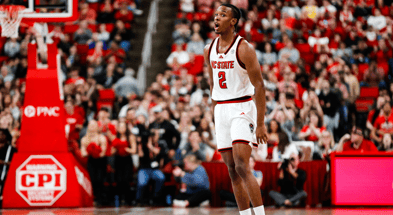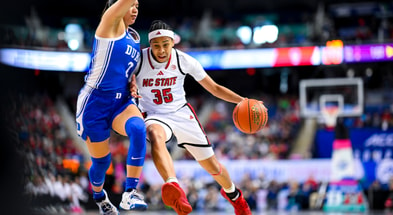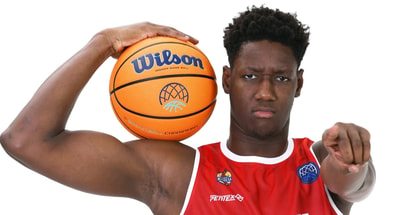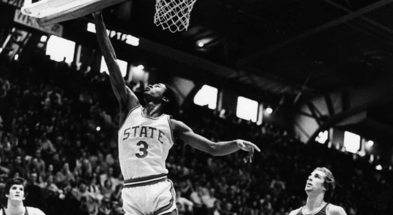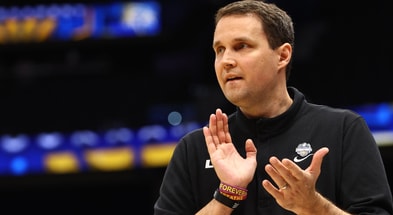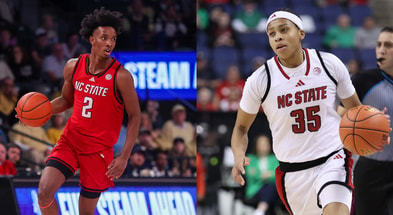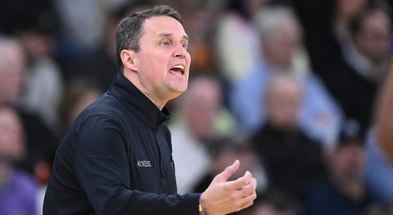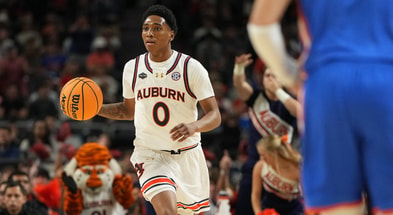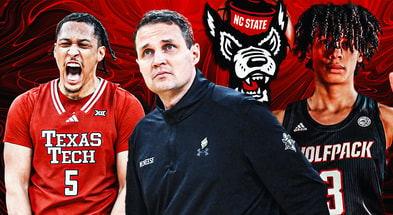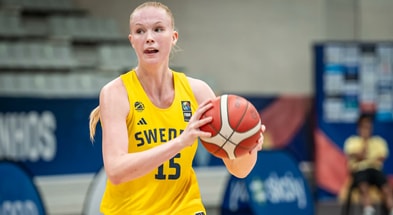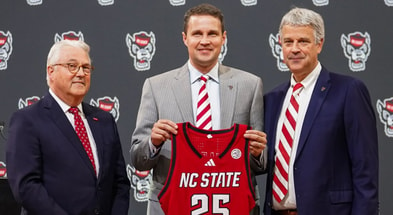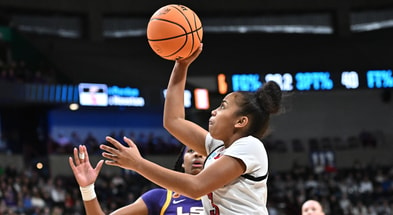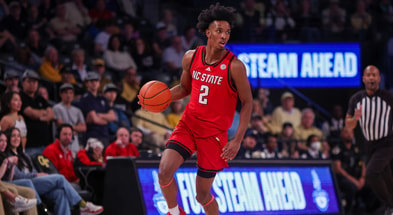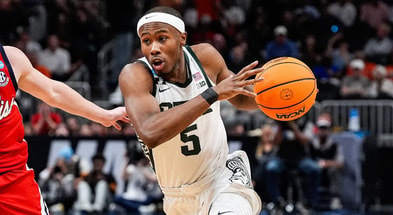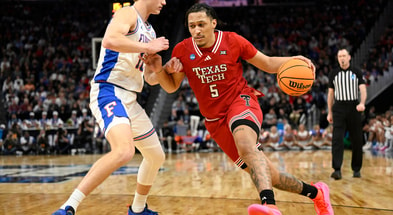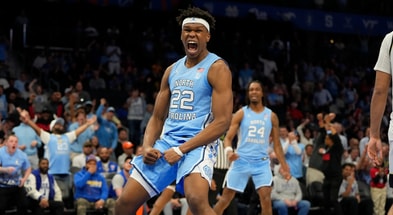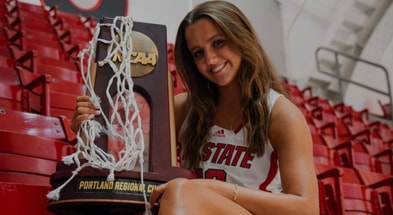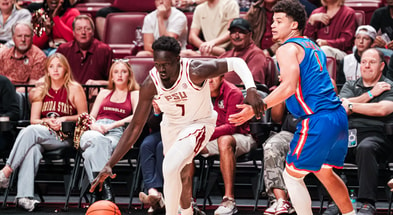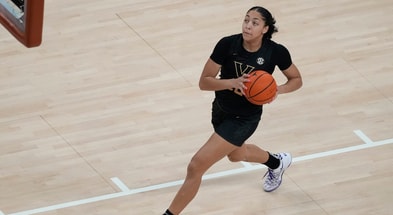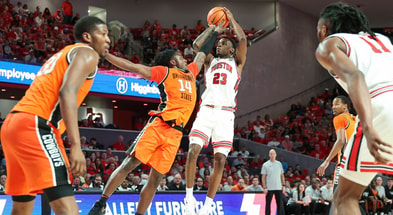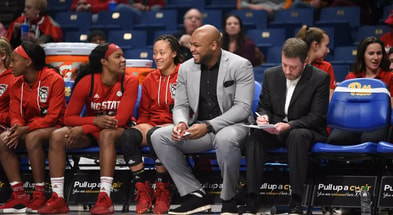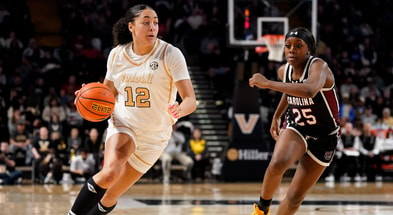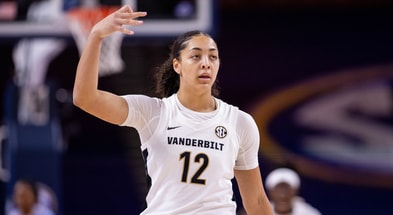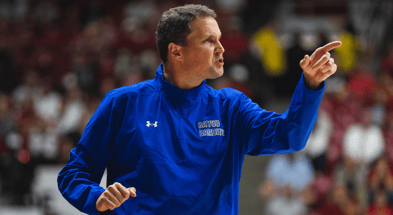NC State basketball vs. the officials
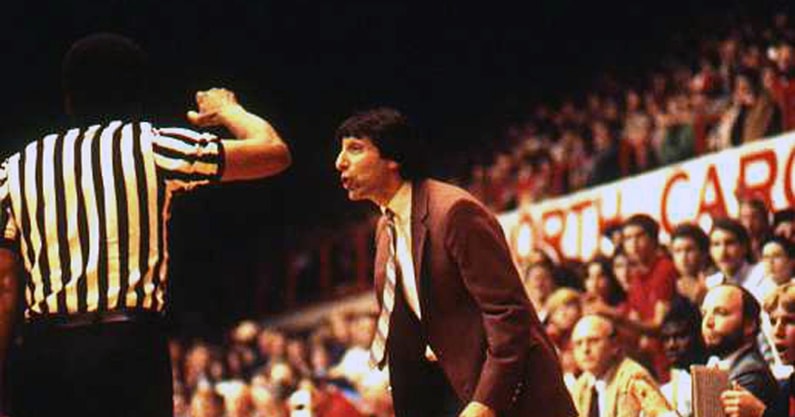
Ah, officiating. Is there anything that can bring opposing fanbases, like NC State and North Carolina, together quite like debating the relative merits of how much their team has been screwed by referees or umpires?
Of course not.
The events of the last week or so prove it, following NC State’s game last weekend at North Carolina, where the disparity between free throws and flagrant fouls on both teams seemed to have an impact on the game’s outcome. One player, Wolfpack star guard Terquavion Smith, was taken off the court on a stretcher and spent some time in the hospital.
Do officials matter? Sure they do, but it’s not always clear when viewed through a partisan lens.
Full disclosure here: My dad spent years running up and down the courts of junior high, high school and small college gyms across the state officiating girls, boys, men’s and women’s basketball game and behind the plate of baseball fields all over the foothills of North Carolina. That part-time job, which sometimes included up to 16 games a week, is how he paid for family vacations and occasional weeknight trips to slide down the hills at Sugar Mountain Ski Resort.
I earned spending money at NC State by refereeing and umpiring basketball and baseball games at Carmichael Gym and Harris Fields. If you ever want to write analytically about sports, spend a few hours with a whistle in your mouth or wearing shin guards, a chest protector and a mask.
So, in general, I have a sympathetic heart for the job game officials are required to do.
That doesn’t mean I haven’t been escorted from a game or two, kicking, screaming and uttering the words “mockery of the game” when my son played baseball.
I don’t take the following list of worst calls against NC State men’s basketball lightly because I know it can always seem like sour grapes or the worst kind of loyal fanaticism. But each is a call that have subjectively been acknowledged as bad or wrong and, in some cases, apologized for.
I do find it a bit funny at times when Wolfpack fans feel a little too persecuted by officials. One of the building blocks of NC State basketball coach Everett Case’s program when he was introducing big-time basketball to the South was owning the officials. Along with having the friendliest home court in the country, Case had the friendliest officials on the court en route to nine conference titles in 10 years and a total of four ACC titles.
In particular, he spent so much money bringing Lou Eisenstein and Phil Fox, down from their homes in New York to officiate Southern Conference, Atlantic Coast Conference, Dixie Classic and NCAA Tournament games, they may as well lived in the spare bedroom of Case’s Cameron Village home. They were acknowledged to be two of the best officials in the game, and Case was smart enough to keep them in his hip pocket.
An excerpt from “NC State Basketball: 100 Years of Innovation”:
That didn’t always sit well with opponents. LaSalle was leading the Wolfpack by 11 points during a 1951 regular-season game. But several controversial calls by Fox, all in favor of Case’s team, allowed the Wolfpack to roar back for a 76-74 victory. LaSalle coach Ken Loeffler stormed out of the Coliseum and walked along the railroad tracks all the way back to the downtown Sir Walter Hotel in a huff. Among the things he said before he left was “This [was] one of the biggest steals since the Louisiana Purchase.”
Billy Packer, veteran television announcer and a player for Wake Forest in the 1960s, remembers well how hard it was for a Wolfpack opponent to catch a break at Reynolds Coliseum.
“You have to realize, Case was the most powerful person in basketball at the time,” Packer said. “He played 25 home games a year at Reynolds, when you counted the Dixie Classic and the ACC Tournament. And 22 of those games were called by the same two refs.
“If you played at NC State, you had everything working against you. They had the home court advantage every time.”
Packer remembers watching the ball go out of bounds off a Wolfpack player and walking over to the sidelines to throw the ball back in play.
“The ref would say, ‘No, it’s our ball,’ and give it to NC State,” Packer said. “The NC State people had unbelievable advantages in the 1950s and ‘60s.”
Still, it’s much more fun to feel persecuted than protected by the guys armed with their own interpretations of the rule book.
The ACC, of course, has had an interesting relationship with their officials. For years, the best league in the country had the best officials, but that reputation didn’t last. Forty-five years ago, the league banned its own officials from ACC tournament, saying they might be so familiar with the teams and players they might show favoritism to one over another. It did not go over well.
In 1988, seven of the league’s best officials were hired by the NBA, leaving the ACC to promote nearly a dozen younger officials who weren’t quite ready to judge the best league in the country. By 1994, it still hadn’t recovered even though the ACC was the first league in the country to require three officials in all conference games.
There are now countless replays and officials to review them. Officiating doesn’t seem to be much better.
Maybe it’s impossible to ask older men and women to get up and down the court with younger, mostly better-conditioned athletes. That’s long been the argument for football which has seven officials, a reserve and two replay coordinators.
What is true, more than anything else, is that games officiated by humans will always be imperfect. As of yet, there is no better alternative.
For me, these are some of the worst calls in NC State basketball history, all made worse because they happened in the postseason.

NC State vs. Canisius, NCAA first round, 1956
The best team Everett team ever coached was already hampered by a late-season injury to versatile forward Ronnie Shavlik, suffered in the final game of the regular season. Case’s team managed to get through the ACC Tournament, thanks to an MVP performance by All-American guard Vic Molodet.
The Pack even seemed to be back on track to meet defending champion and top-ranked San Francisco, a matchup of the top teams in the East and the West. But it didn’t happen, thanks to one of Case’s own officials.
In the first round of the NCAA Tournament, played at New York’s Madison Square Garden, NC State drew tiny Canisius of Buffalo. Shavlik had more than 10 days to get used to wearing a heavy leather brace on his arm, but was hardly the same player as he had been for three seasons under Case.
In the first half, Fox called Molodet for several charging calls, keeping the Pack’s floor leader on the bench for more than 32 minutes of action. He fouled out in the first of four overtimes, and Canisius pulled off the upset in the longest NCAA tournament game ever played.
“That is the greatest disappointment I’ve ever had in 36 years of playing basketball,” says the 90-year-old Molodet. “I just couldn’t believe he made all those charging calls against me. I don’t know what the hell happened.”
Canisius captured the game when a little-used substitute whose name and jersey number weren’t even in the game program made a 30-foot desperation shot to end the game after four extra periods.
NC State vs. Pittsburgh, NCAA Tournament, 1974
Unlike the others, this was a call that wasn’t made when NC State played Pittsburgh in Reynolds Coliseum in the second round of the 1974 Championship. Norm Sloan’s Pack had already survived an undefeated regular season against the most challenging league slate it ever played and an overtime win against Maryland in the best college basketball game ever played.
Pittsburgh, however, decided it had an opportunity to beat the Wolfpack on its own floor by being physical with superstar forward David Thompson. Through the early half of the game, the Panthers hacked Thompson every time he went up to shoot, frustrating the junior from Shelby to no end.
Midway through the half, Thompson went up for a jumper and was hacked and smacked across the head, with no foul called. He raced down the court with the sole purpose to block the next shot Pittsburgh took. He went up to do so, but tripped over teammate Phil Spence’s shoulder, fell to the wooden surface of Reynolds Coliseum and was knocked unconscious. Many people in the arena that day thought there was no way Thompson could survive such a traumatic fall.
He was rushed to Rex Hospital. The game resumed and NC State began to play physical basketball as well, led by a motivated Tommy Burleson. When Thompson returned, his head bandaged with white gauze, late in the second half, the place erupted in the loudest cheers in its history.
That was not good for Thompson’s headache, but he managed to return five days later to lead the Pack to a double-overtime win over seven-time champion UCLA in the semifinals and a double-digit win over Marquette in the finals to give NC State its first NCAA team title in any sport.
Top 10
- 1New
Report Card
Offense gets an A- at Wake
- 2Trending
Another Pack comeback
Team has a certain swagger
- 3
Doeren on targeting call
‘That doesn’t make sense to me’
- 4
Battle Tested
Pack comes back from 14-0 to move to 3-0
- 5
Commit analysis
4-star Trevon Carter-Givens
Get the Daily On3 Newsletter in your inbox every morning
By clicking "Subscribe to Newsletter", I agree to On3's Privacy Notice, Terms, and use of my personal information described therein.
NC State vs. Georgetown, NCAA third round, 1989
This game is obviously high ranking on the list because, if only because CBS commentator Packer said immediately after official Rick Hartzell called Wolfpack guard Chris Corchiani for traveling against the top-seeded Hoyas that it was, “The worst call in the history of the NCAA Tournament.”
Many still agree with that statement in what turned out to be the last NCAA tournament game ever coached by NC State’s Jim Valvano.
What most observers saw was Georgetown star Alonzo Mourning commit his fifth foul by blocking a Corchiani drive with 1:47 remaining in the game. Corchiani made the basket and was headed to the line for a game-tying free throw until Hartzell paused for a second, called Corchiani for walking and waved off the basket.
“Are you crazy?” said Valvano, who said much more colorful things in the postgame locker room.
The Hoyas went down the floor, hit a 3-pointer to build its lead back up to six and advanced to the Elite Eight to play Duke.
That summer, Valvano ran into Hartzell in the airport and the longtime ACC official told the coach, “I blew the call.”
Valvano accepted the apology.
The next season, Hartzell returned to Reynolds Coliseum to officiate an NC State-Marathon Oil preseason exhibition game and motioned Corchiani over to the sidelines and gave him a sincere apology.
“That was good with me,” Corchiani said at Tuesday night’s NC State-Notre Dame game. “He took responsibility for it.
“But, I gotta tell you, I am so over talking about that game.”
NC State-Maryland, ACC Tournament, 2004
Herb Sendek’s second-seeded NC State basketball squad owned a 10-point lead early in the second half against seventh-seeded Maryland at the Greensboro Coliseum, less than 16 minutes away from a third consecutive trip to the ACC Tournament finals — and a third consecutive meeting with Duke.
The team spent the timeout sitting on stools taken out on the floor by team managers, a preference Sendek picked up during his days at Kentucky with Rick Pitino. NC State had multiple managers who were responsible for bringing the stools back to the bench and wiping up any sweat the players might have left on the floor.
Because the previous game had gone long, game officials were told to speed up play coming out of timeouts.
Terrapin guard John Gilchrist received a quick inbounds pass, just as Wolfpack manager Chris Falk stopped to wipe up one last puddle of sweat near the sidelines.
When he heard Larry Rose’s whistle blow as Gilchrist raced by, Falk knew exactly what was about to happen: The Wolfpack bench received a technical foul for having sideline personnel on the court.
“It was the worst feeling in the world,” says Falk, who earned an NC State degree in business administration and now works for an engineering firm in Wake Forest. “Herb had no idea what was going on.
“I was just wishing a big hole would open in the Greensboro Coliseum floor and I could disappear.”
Gilchrist, en route to a career-high 30 points, made the two technical free throws and a jumper to cut the Wolfpack’s lead to six points and shifting the momentum for the entire game. The Terps not only completed the comeback against the Wolfpack, but also upset Duke in the championship game to win head coach Gary Williams’ only ACC tournament championship at his alma mater.
Falk apologized profusely to Sendek after the game, and the coach accepted the apology.
“He was super gracious about the whole thing, and never got on me about it,” Falk says.
However, the Monday after the tournament, ACC director of officials Fred Barakat admitted at a lunchtime sports club meeting that Rose had made a “horrible call” that was unnecessary. Barakat pulled Rose from calling the championship game. He did not did not call another ACC game and retired as a referee in 2007 to become the coordinator of officials for the Mid-Eastern Athletic Conference.
Rose also apologized for the technical.
“The technical foul is something I can laugh about now, but it was not funny at the time,” Falk says. “To be honest, every time I see managers or ball boys on the court wiping up puddles of sweat, I kind of get a knot in my stomach.”
Two games later, that same NC State team would be victimized by another tough call, when forward Marcus Melvin was hit with a controversial intentional foul with 1:51 left against Vanderbilt in the second round of the NCAA Tournament. Two free throws and a three-pointer on the ensuing possession turned a 6-point Wolfpack lead to just one.
Vandy would eventually upset the third-seeded Wolfpack by two points, robbing Sendek and the Pack of a Sweet 16 appearance.
Tim Peeler is a regular contributor to The Wolfpacker and can be reached at [email protected].
